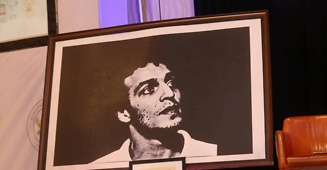15 May 2018
Nine hundred participants from all regions of the world took part in UNESCO’s flagship celebration of World Press Freedom Day, which took place in Accra, Ghana, on 2 and 3 May. Some 90 nationalities were present at the event, organized by UNESCO and the Government of Ghana.
Over two days, participants focused on the role of journalism as a watchdog in society and examined the relationship between the media, the judiciary and rule of law.One of the highlights of the event was the awarding of the UNESCO/Guillermo Cano World Press Freedom Prize to the Egyptian photojournalist Mahmoud Abou Zaid, aka Shawkan. Imprisoned in Egypt since 2013 when he was arrested while covering protests, Shawkan risks the death penalty.
The Award ceremony was hosted by the President of the Republic of Ghana, Nana Akufo-Addo, and the Deputy Director-General of UNESCO, Getachew Engida.
During the event, President Akufo-Addo declared that the Ghanaian people would always defend the right to freedom of expression because of their determination to build a free, open society with accountable governance. Referring to the repeal of the Criminal Libel Law in Ghana in 2001, Akufo-Addo said: “I much prefer the noisy, boisterous, sometimes scurrilous media of today, to the monotonous, praise-singing, sycophantic one of yesterday. The Ghanaian media has, in fact, enriched the nation’s governance by its curiosity, investigative skills, and persistence.”
At the opening of the conference, Nnenna Nwakanma, Senior Policy Manager at the World Wide Web Foundation, reminded participants of the huge shift in the media landscape since 1991, when the Windhoek Declaration on Free, Independent, and Pluralistic Media triggered the establishment of World Press Freedom Day. At that time, the Internet was still a guess to many, while at the end of 2018, for the first time in human history, 50% of the world will be online. For Nwakanma, this means “New writers. New editors. New tools. New outlets. New readers. Great opportunities. Opportunities to connect more. Opportunities to disseminate. Opportunities to do more”.
During the second plenary, speakers discussed the risks encountered by investigative journalists, especially when uncovering corruption and political malpractice. Stephanie Busari, Africa Digital Editor at CNN, captured the essence of the discussion by saying: “You can kill, but you can’t kill the stories.” This session also featured the participation of Jose Ugaz, former ad-hoc state attorney in Peru, Oluwatoyosi Ogunseye, head of West Africa for the BBC World Service, Will Fitzgibbon of the Consortium of Investigative Journalism, Petra Caruana Dingli, journalist from Malta, and Job Rabkin, investigations editor at Channel 4.
In his keynote address, Rabkin discussed his team’s undercover investigation of Cambridge Analytica, which exposed the corrupt methods of the data analysis company aimed at influencing election results, including during the last USA presidential elections. His intervention coincided with the news that Cambridge Analytica was filing for bankruptcy. Rabkin reminded participants that technology is changing so fast and spreading so wide that the law in most countries lags behind. “That means that we the press are often the last line of defence,” he said.
At the close of the conference, participants adopted The Accra Declaration which calls on UNESCO’s Member States to put in place dedicated national mechanisms for the safety of journalists and to respect judicial decisions of regional human rights courts. It also calls on UNESCO to continue providing journalists with capacity building in digital safety and security.
The annual exhibition of World Press Photo held during the conference showcased the work of the laureates of one of the most coveted and recognized photojournalism awards. Additionally, UNESCO and the German art collective Wahrheitskämpfer (Truth Fighters) exhibited portraits of 50 killed journalists.
Special coverage of the event was ensured by an embedded Youth Newsroom of 40 young journalists from all over the world.
Around 100 events organized by UNESCO and other organizations around the world marked this year’s World Press Freedom Day celebrations.
Permanent link: http://en.unesco.kz/25th-edition-of-world-press-freedom-day-reinforces-watchdog-role-of-media

